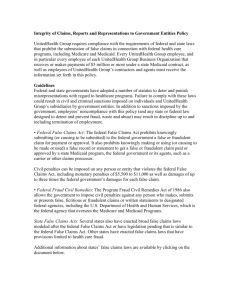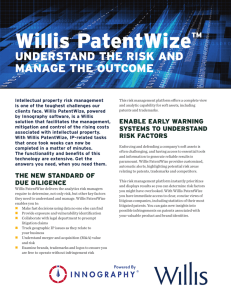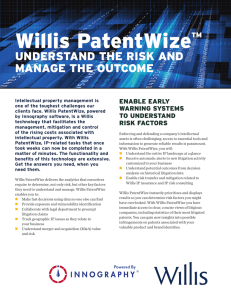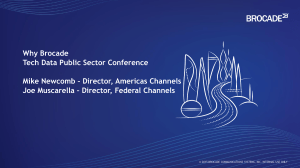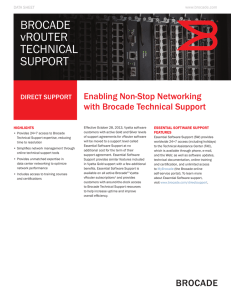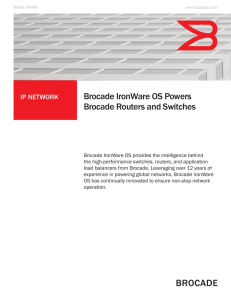ALERT July 04 v5.qxd
advertisement
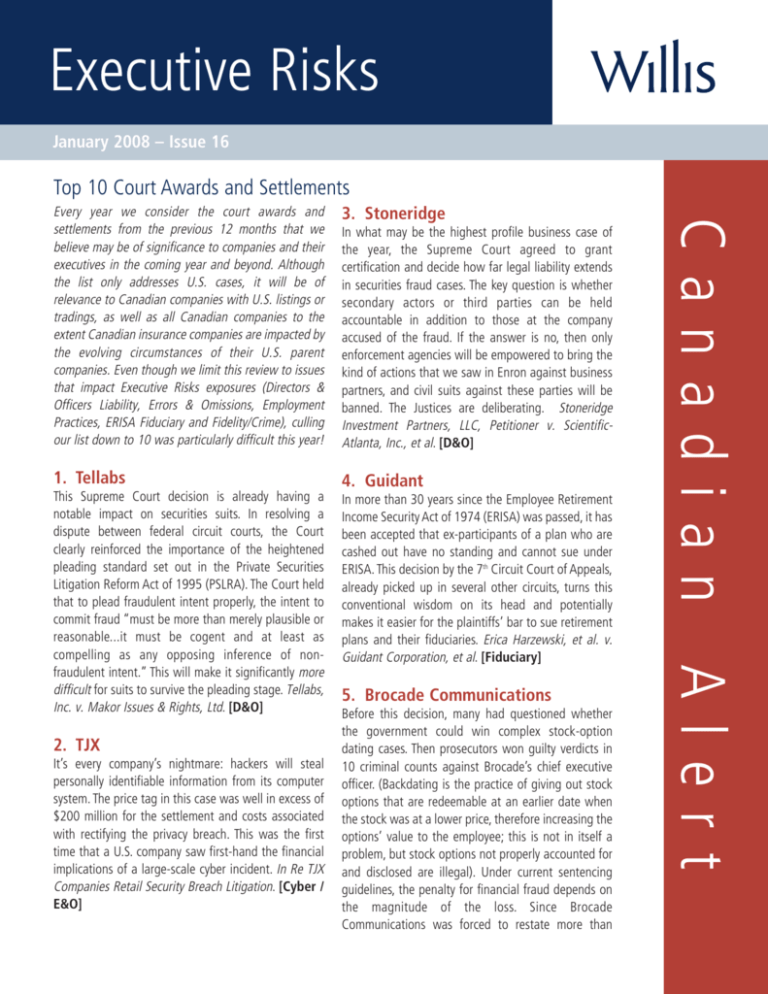
Executive Risks January 2008 – Issue 16 Top 10 Court Awards and Settlements In what may be the highest profile business case of the year, the Supreme Court agreed to grant certification and decide how far legal liability extends in securities fraud cases. The key question is whether secondary actors or third parties can be held accountable in addition to those at the company accused of the fraud. If the answer is no, then only enforcement agencies will be empowered to bring the kind of actions that we saw in Enron against business partners, and civil suits against these parties will be banned. The Justices are deliberating. Stoneridge Investment Partners, LLC, Petitioner v. ScientificAtlanta, Inc., et al. [D&O] 1. Tellabs 4. Guidant This Supreme Court decision is already having a notable impact on securities suits. In resolving a dispute between federal circuit courts, the Court clearly reinforced the importance of the heightened pleading standard set out in the Private Securities Litigation Reform Act of 1995 (PSLRA). The Court held that to plead fraudulent intent properly, the intent to commit fraud “must be more than merely plausible or reasonable...it must be cogent and at least as compelling as any opposing inference of nonfraudulent intent.” This will make it significantly more difficult for suits to survive the pleading stage. Tellabs, Inc. v. Makor Issues & Rights, Ltd. [D&O] In more than 30 years since the Employee Retirement Income Security Act of 1974 (ERISA) was passed, it has been accepted that ex-participants of a plan who are cashed out have no standing and cannot sue under ERISA. This decision by the 7th Circuit Court of Appeals, already picked up in several other circuits, turns this conventional wisdom on its head and potentially makes it easier for the plaintiffs’ bar to sue retirement plans and their fiduciaries. Erica Harzewski, et al. v. Guidant Corporation, et al. [Fiduciary] 2. TJX It’s every company’s nightmare: hackers will steal personally identifiable information from its computer system. The price tag in this case was well in excess of $200 million for the settlement and costs associated with rectifying the privacy breach. This was the first time that a U.S. company saw first-hand the financial implications of a large-scale cyber incident. In Re TJX Companies Retail Security Breach Litigation. [Cyber / E&O] 3. Stoneridge 5. Brocade Communications Before this decision, many had questioned whether the government could win complex stock-option dating cases. Then prosecutors won guilty verdicts in 10 criminal counts against Brocade’s chief executive officer. (Backdating is the practice of giving out stock options that are redeemable at an earlier date when the stock was at a lower price, therefore increasing the options’ value to the employee; this is not in itself a problem, but stock options not properly accounted for and disclosed are illegal). Under current sentencing guidelines, the penalty for financial fraud depends on the magnitude of the loss. Since Brocade Communications was forced to restate more than Canadian Alert Every year we consider the court awards and settlements from the previous 12 months that we believe may be of significance to companies and their executives in the coming year and beyond. Although the list only addresses U.S. cases, it will be of relevance to Canadian companies with U.S. listings or tradings, as well as all Canadian companies to the extent Canadian insurance companies are impacted by the evolving circumstances of their U.S. parent companies. Even though we limit this review to issues that impact Executive Risks exposures (Directors & Officers Liability, Errors & Omissions, Employment Practices, ERISA Fiduciary and Fidelity/Crime), culling our list down to 10 was particularly difficult this year! $300 million in earnings as a result of its options practices, the potential penalty, soon to be decided, might be severe. Prena Smajlaj, v. Brocade Communications Systems, Inc., et al. [D&O] 10. Just For Feet Four former outside directors paid a combined $40 million to settle the case against them by the defunct corporation's bankruptcy trustee. This settlement is believed to be among the largest out-of-pocket payments by outside directors and executives following corporate fraud allegations and keeps the potential for personal liability in the spotlight. Just For Feet, Inc., et al., Debtor(s); Charles R. Goldstein Chapter 7 Trustee, Plaintiff v. Hickory Brands, Inc. [D&O] 6. UnitedHealth In what is likely to be the largest D&O derivative settlement on record, UnitedHealth is estimating the total amount of settlement agreements in its stock-option dating litigation, together with the amounts voluntarily relinquished by current and former executives (including the surrender and repricing of options), at roughly $900 million. Even if a large percentage of this amount represents disgorgement, it is a new high-water mark for D&O derivative suits. In re: UnitedHealth Group Incorporated Shareholder Derivative Litigation. [D&O] Executive Risks Regional Contacts Jonathan Ashall 145 King Street West Suite 1200 Toronto, ON M5H 1J8 P- 416 646 8351 F- 416 869 1649 jonathan.ashall@willis.com 7. Wal-Mart The fight continues over class certification for the first national class action alleging systemic gender discrimination. In the most recent decision, soon to be on appeal, the California Court of Appeals declined to apply the higher standard for allowing a class action as set out in last year’s In re IPO Securities Litigation. The scene is now set for further consideration of this important decision. Betty Dukes; Patricia Surgeson; Cleo Page; Deborah Gunter; Karen Williamson; Christine Kwapnoski; Edith Arana, Plaintiffs-Appellees, v. Wal-Mart, Inc. [EPL] Janet Bos 145 King Street West Suite 1200 Toronto, ON M5H 1J8 P- 416 216 0794 F- 416 368 9189 janet.bos@willis.com 8. BDO Seidman The half-billion-dollar decision against the world’s fifth largest accounting firm appears to be the largest judgment ever against an audit firm, and may bankrupt the partnership. A jury found the auditors guilty of gross negligence in failing to spot massive fraud at an account receivables factoring company that had cost a bank client $170 million; another $351 million in punitive damages was added to this amount for a total court award of $521 million. This massive award provides further fuel to the debate about whether the liability of audit firms for fraud should be capped or limited. Banco Espirito Santo SA v. BDO Seidman LLP. [E&O / Fidelity] Murn Meyrick 145 King Street West Suite 1200 Toronto, ON M5H 1J8 P- 416 216 0774 F- 416 869 1649 murn.meyrick@willis.com Catherine Richmond 1500-1095 West Pender Street Vancouver, BC V6E 2M6 P- 604 605 5611 F- 604 683 5746 catherine.richmond@willis.com 9. Goodyear Tire & Rubber This pro-defense decision considered time constraints for seeking relief in Title VII employment discrimination suits. The majority in this 5-4 Supreme Court decision held that employees alleging disparate treatment based on gender or race must make their claims within 180 days of the original discriminatory action – not within 180 days of their last paycheck (or act of discrimination), as had been previously thought. This decision may reduce both the frequency and severity of certain Employment Practices Liability claims. Lilly M. Ledbetter, Petitioner v. The Goodyear Tire & Rubber Company, Inc. [EPL] Executive Risks Alerts and Newsletters provide a general overview and discussion on a wide range of topics. They are not intended, and should not be used, as a substitute for legal advice in any specific situation. 2 Willis North America • 01/08





